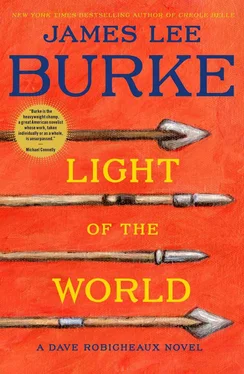“What did it say?”
“It was a grandiose statement based on an excerpt from the Bible.”
“Could you take a photograph of that and e-mail it to me?”
“I burned it.”
“You set lots of fires in caves, do you?”
I could feel my pulse beating in my throat.
“You there?” he said.
“It was an impulsive moment.”
“Really? An aunt of the missing woman received a postcard from the missing woman yesterday. It was postmarked Boise, Idaho. The handwriting seems to be hers.”
“You’re wrong, sir.”
“We’ll try to blunder through and see what happens,” he replied.
“Tell you what,” I said. “Forget I called. We’ll update you if we come across any information we think you should have.”
“You’ll do what ?” he said.
I hung up, feeling foolish and vain and ultimately old, even for my years. Also, I had not told him about Gretchen Horowitz’s possible contact with Surrette. Why? I thought his agency wanted to hang her out to dry and I would be giving them the ammunition to do it. If they went after Gretchen for obstruction, of which she may have been guilty, they might take Alafair for good measure. What about the waitress named Rhonda Fayhee? I couldn’t get her off my mind. I called Special Agent James Martini back. “Someone I know may have established contact with Surrette,” I said. “This individual ran a notice in the personals and got a response from a guy who sounds like Surrette.”
“You mean you heard his voice?”
“No, I have not heard his voice. My daughter, Alafair, interviewed him in a Kansas prison. I think he has tried to kill her. I think he’ll try again. That’s why I have a personal stake in the investigation.”
“What’s the name of the person who made contact with the guy you think is Surrette?”
My head was pounding, the veins in my wrists throbbing. “Gretchen Horowitz,” I said.
“She’s a friend of yours?”
“You could say that.”
“Believe me, if I meet you in person, I’ll have a lot to say to you,” he replied.
I went to Alafair’s room and told her what I had just done. She looked at me for a long time. The window was open, and I could hear the leaves of last winter scudding dryly across the driveway. “I don’t know what to say, Dave,” she said. “Do you want to tell Gretchen or should I?”
“I will.”
“Why did you do it?”
“Rhonda Fayhee’s life is in the balance.”
“How about Gretchen’s?”
“Gretchen has choices. The waitress doesn’t,” I said.
She had been working on her manuscript with a blue pencil, deleting adjectives that were not in the predicate form, compressing sentences, paring the dialogue down to the bone until there wasn’t a rattle in a single line. She set her pencil at the top of a page and stared out the window. A brief sun shower had just blown through the valley, and a rainbow had descended out of the clouds into the middle of the north pasture, where the horses were standing under a clump of cottonwoods. “I know you’ve acted in conscience,” she said. “But I feel emptier than I think I’ve ever felt. I want to go away and be alone for a long while. It’s not your fault, so you don’t need to say anything more. As a great favor, please don’t say anything to me at all. I’ll be in your debt.”
She got up from her chair and walked downstairs and out the door. I heard her car start and drive away. When I looked at the pasture again, the rainbow had dissolved into a poisonous patch of henbane as quickly as it had formed.
I am sure there are those who would dismiss Gretchen Horowitz as a sociopath. Her body count would indicate that. However, she was a complex human being, and I suspected that more than one person lived inside her skin. Sigmund Freud borrowed most of his clinical terminology from the ancient Greeks, who possessed a cultural insight into the foibles of human behavior like no civilization before or since. If I’ve learned anything at all from my years, it’s the simple lesson that human beings are always more complicated, brave, long-suffering, and, ultimately, heroic than we ever guessed, and that none of us completely understands another, no matter how intimate we are with them.
I put the face of the pimp named Mack on the enemy soldiers I killed in Vietnam. What if I had not gone to Vietnam? Would I have found another way to release my rage upon other surrogates here in the United States? As a police officer, yes.
Gretchen drove up the dirt road at five that afternoon. She parked her pickup beside the north pasture and started walking toward the pedestrian gate. From the yard I could see Clete in front of their cabin, barbecuing a pork roast on the grill, fanning the smoke out of his face. I headed Gretchen off before she could go through the gate. “I have to talk to you,” I said.
She turned toward me. As always, there was a martial element in her body language, an intensity in her eyes, that you did not want to directly confront. She was holding a manila envelope in her right hand. “What is it?” she said.
“I dimed you with the feds.”
“About what?”
“Your contact with Asa Surrette.”
“Alafair told you I talked with him?”
“I wouldn’t have called them, Gretchen, but I think Rhonda Fayhee may still be alive.”
“So you’re telling me I might get picked up for obstruction or even aiding and abetting?”
“It’s a possibility.”
“Now you want absolution? That’s what this is about?”
“I didn’t have a choice,” I said.
“Yeah, you did. You could have talked to me first. While the local jokers were figuring out ways to put away me or Wyatt Dixon, Alafair and I did some research on Felicity Louviere.”
“What did you find out?”
“Her mother died in Mandeville. Insanity evidently runs in the family. Felicity was known as anybody’s punch before Caspian Younger met her. You know what else we found out?”
“Sorry, I don’t.”
“She got involved with some rural black people whose neighborhoods were being used as sludge ponds for petrochemical waste. She tried to stop a tanker truck from dumping a load in an open pit in St. James Parish and was almost run over.”
“What are you trying to tell me?”
“What’s it sound like? For all I know, she’s a schizoid. But I think better of her than I did. We also found out that Love Younger kept fuck pads in Atlantic City and Vegas and Puerto Rico, in the same casino hotels where his son had six-figure credit lines.”
“He’s not the oil industry’s answer to Cotton Mather?”
She stepped closer to me, her chest rising and falling, her shirt pulled tight on her shoulders. “I don’t like people fucking me over, Dave. And I think that’s what you did.”
“If you’d squared with your father and me, we wouldn’t have this problem.”
“What makes you think I didn’t square with him?”
I looked past her shoulder at Clete flipping the roast with a fork on the grill, his face happy at the prospect of having his daughter home and the possibility of inviting his friends to dinner. “I believe you did what you thought was right, Miss Gretchen,” I said. “I apologize if I’ve caused you harm.”
She puffed out one cheek and tapped the heel of her fist on the fence rail. “I was parked down at Harvest Foods. I’d left my window partly down. When I came outside, this had been dropped on the seat.”
She removed an eight-by-ten photograph from the manila folder and handed it to me. It was probably taken without a flash. The interior of the room was gray, the walls concrete and without windows, like those in a basement. The lighting was poor. A woman dressed only in her undergarments was bound in a chair, a gag tied across her mouth. The eyes had been razored out of the photo, creating the effect of a mask, making any positive identification of the woman impossible.
Читать дальше












